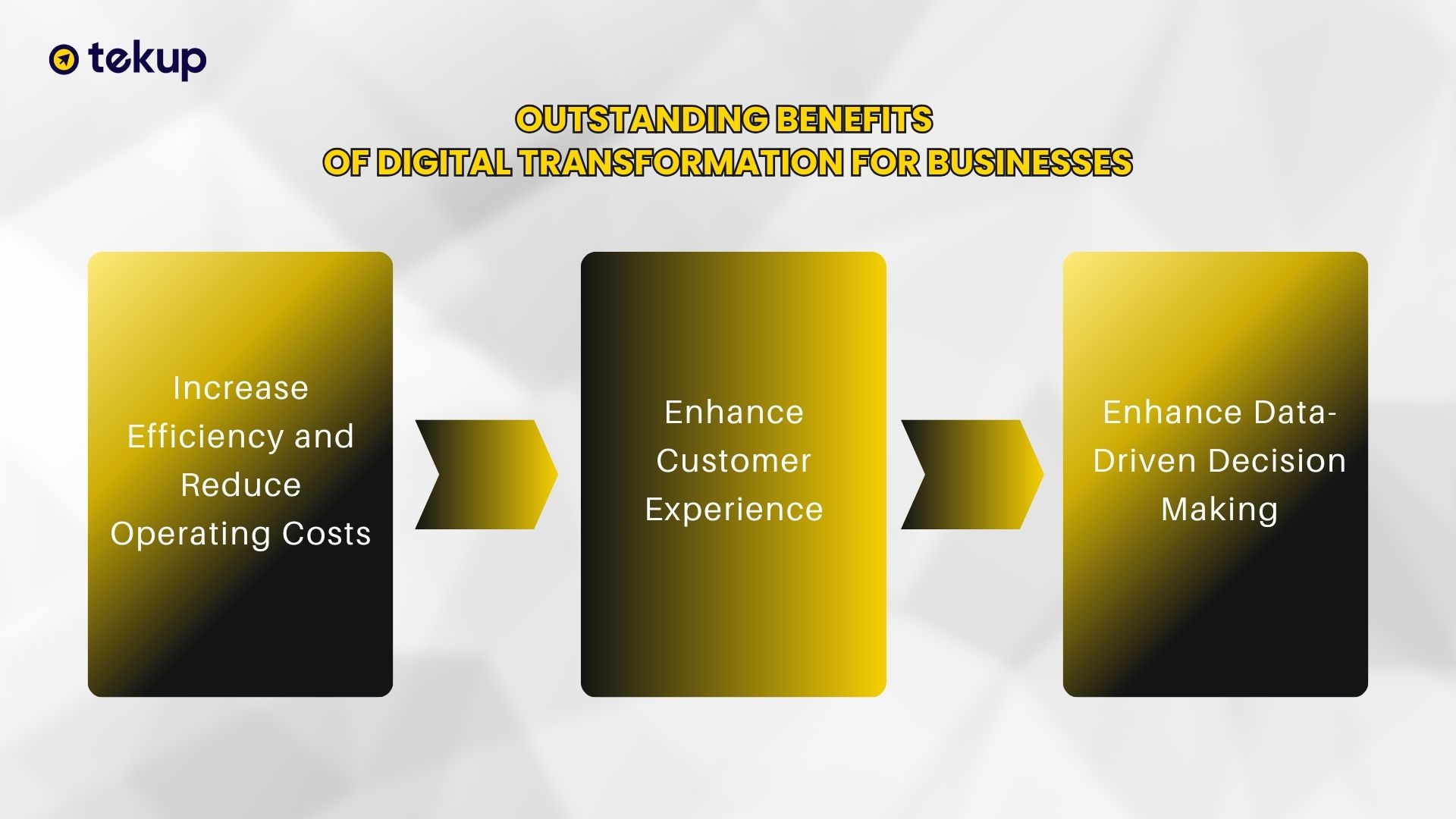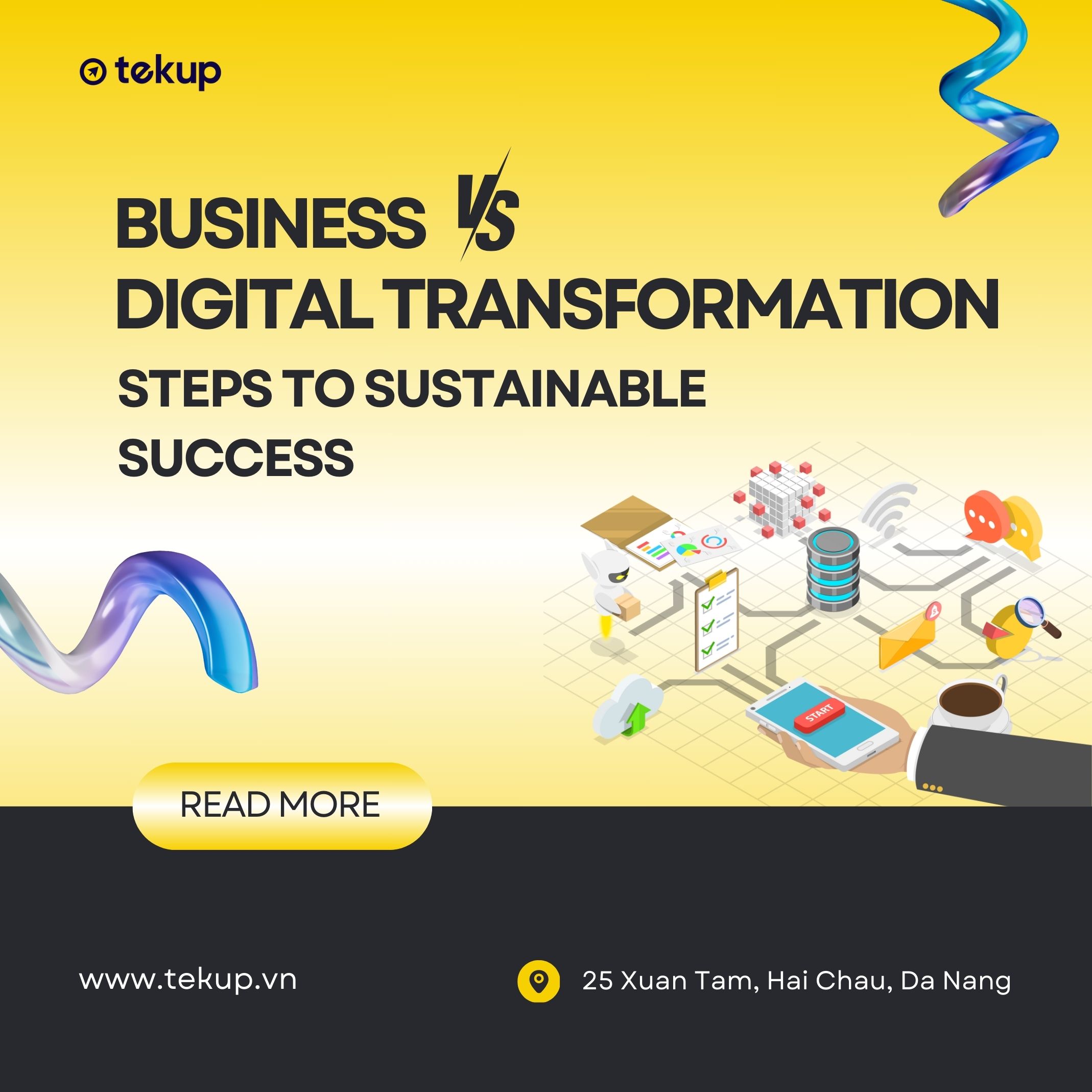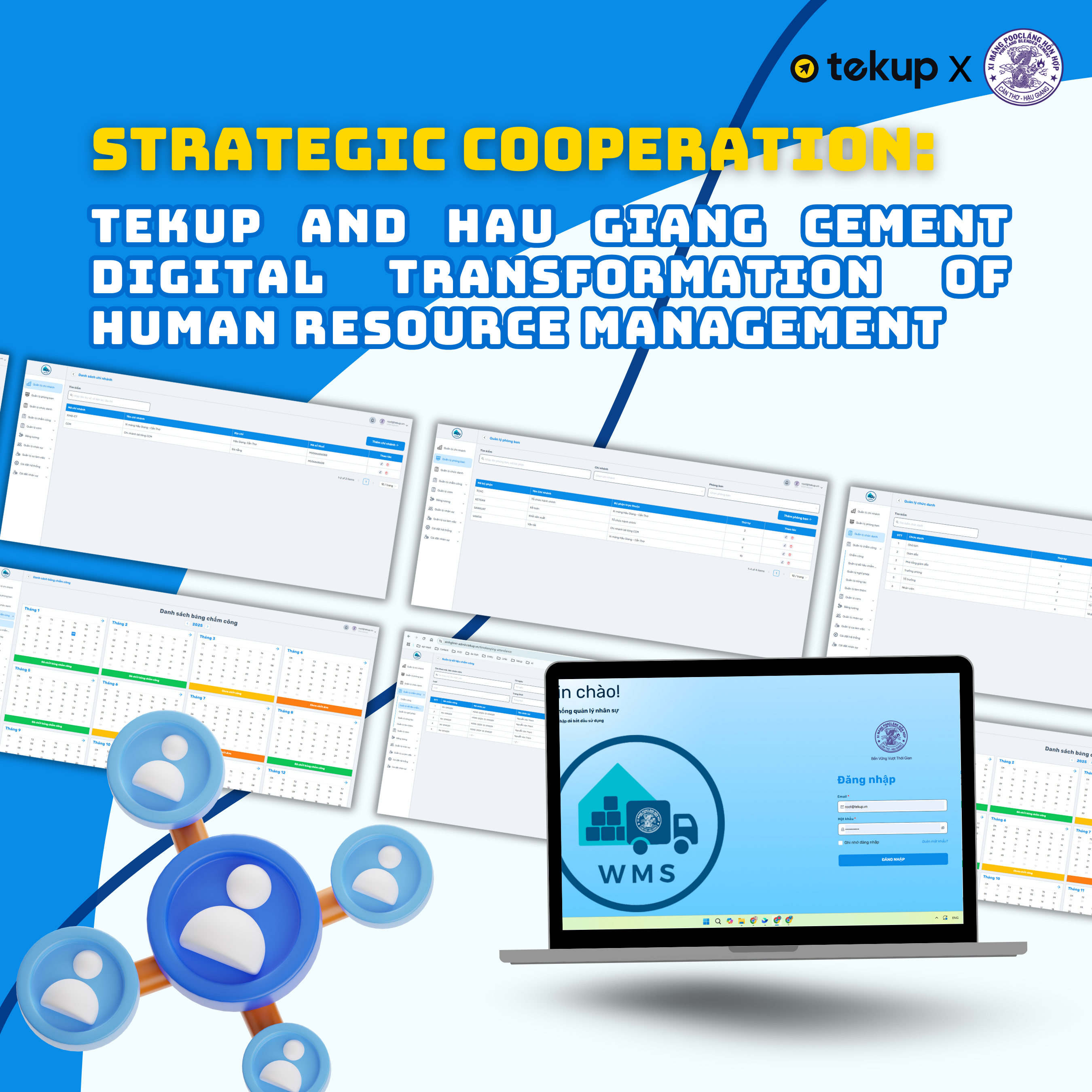Comprehensive digital transformation and reaching new heights? Let’s explore the solutions and strategies below with Tekup. In the context of rapid technological advancement, digital transformation is not merely about integrating technology into workflows but also a comprehensive shift in mindset, strategy, and business models. By leveraging digital solutions, businesses can enhance operational efficiency, optimize costs, and create superior customer experiences. So, how can businesses achieve successful transformation?
What is digital transformation in business?
Digital transformation and operational methods focus on integrating digital technologies. This process is not just about adopting technology but represents a comprehensive revolution in mindset. It involves incorporating tools such as software, artificial intelligence (AI), the Internet of Things (IoT), and cloud computing to optimize processes, enhance operational efficiency, and create new business models.
The main goal of digital transformation is to help businesses:
- Increase productivity and operational efficiency.
- Enhance customer experience through smart and personalized services.
- Expand market reach and drive sustainable revenue growth.
- Optimize management and automate workflows.
- Leverage data to make accurate strategic decisions.
- Strengthen competitiveness in the digital market.
- Contribute to sustainable development and environmental protection.
- Foster innovation within the organization.
Digital transformation is not merely about implementing new technology; it is a strategic shift in how businesses operate and interact with customers. This process requires a fundamental change, breaking away from old models to build a flexible, modern organization that continuously innovates to keep pace with the rapid development of technology and the market.

Why is digital transformation vital to your business?
Adapting to a Rapidly Changing Market: In the digital age, markets and customer demands are constantly changing. Digital transformation helps businesses become more agile, quickly capture new trends, and promptly meet customer needs. Companies that fail to adapt are at risk of being easily eliminated.
Enhancing Competitiveness: Both domestic and international competitors are applying advanced technologies to optimize operations. If businesses do not undergo digital transformation, they will fall behind in the competitive race. Digital transformation is not just a tool, but also a strategy that helps businesses rise to the top.
Optimizing Operational Processes:Digital transformation helps automate and optimize internal processes, minimizing errors and improving work productivity. This not only saves operational costs but also enhances the overall efficiency of the business.
Optimizing Operational Processes:Digital transformation helps automate and optimize internal processes, reducing errors and increasing work productivity. This not only saves operational costs but also improves the overall efficiency of the business.

Data is the Most Valuable Asset: In the digital age, data is considered the “new gold.” Digital transformation helps businesses collect, analyze, and leverage data to make strategic decisions. This allows businesses to operate based on scientific principles, rather than intuition.
Reducing Risks and Increasing Sustainability: Digital transformation helps businesses better predict and respond to business risks. Additionally, modern technologies support sustainable development by optimizing resources and minimizing waste.
Meeting Globalization Trends: With the explosion of technology, businesses no longer compete only domestically but also face global competition. Digital transformation is the key for businesses to expand their markets and connect with customers worldwide.
The Key Benefits of Digital Transformation for Businesses
Increase Efficiency and Reduce Operational Costs
Digital transformation helps businesses automate workflows, from production and inventory management to internal operations. Technologies like Artificial Intelligence (AI), Robotic Process Automation (RPA), and Enterprise Resource Planning (ERP) software help reduce manual tasks and increase labor productivity. This not only cuts down on labor costs but also optimizes resources and minimizes waste. As a result, businesses operate more efficiently, save long-term costs, and increase profits.
Real life example: Many manufacturing businesses have applied IoT and automated systems to monitor production lines, helping to minimize errors and increase productivity.Enhancing Customer Experience
Customer experience is a vital factor in today’s competitive environment. Digital transformation helps businesses personalize services through technologies such as CRM, AI chatbots, and mobile applications. Businesses can easily collect customer data to better understand their needs, allowing them to offer more tailored products and services.
Real-life example: Many retail companies use customer data to personalize promotional programs, creating a more convenient and engaging shopping experience.

Enhancing Data-Driven Decision-Making Capability
In the digital age, data is an invaluable resource. Digital transformation enables businesses to collect, analyze, and process data from various sources. Through data analytics tools and business intelligence (BI), companies can make more accurate decisions based on specific information, rather than intuition. This helps businesses quickly seize market opportunities and minimize business risks.
Real-life example: Financial businesses use data analytics to predict market trends, allowing them to make more effective investment decisions.
The Basic Steps to Successfully Implement Digital Transformation
Assessing the Current State of the Business: Before starting digital transformation, businesses need to conduct a comprehensive assessment of their operations, technology infrastructure, and workforce capabilities. This process helps identify strengths, weaknesses, and areas for improvement. The assessment also involves understanding the business’s needs and setting specific goals for the digital transformation process.
Building a Suitable Digital Transformation Strategy: After assessing the current state, the next step is to develop a clear digital transformation strategy that aligns with business goals. This strategy should include a specific roadmap, prioritize projects, identify necessary resources, and set key performance indicators (KPIs). Additionally, businesses need to ensure buy-in from leadership and create an environment that encourages innovation and is ready for change.
Choosing the Right Technology and Implementation Partners: Selecting the appropriate technology is a key factor for successful digital transformation. Businesses need to consider technologies such as cloud computing, artificial intelligence (AI), the Internet of Things (IoT), and ERP systems, based on their size and industry. At the same time, choosing the right implementation partner will help ensure a smooth and effective transformation process. Experienced partners not only provide technology but also support businesses with training and operations.
Real-Life Success: How Businesses Have Implemented Digital Transformation
Case Study: Tekup and the Cement Distribution Management System for Ha Giang Cement Company
Tekup has successfully implemented a management and distribution system for Ha Giang Cement Company, helping the business improve operational performance and optimize the supply chain. This system has automated order management processes, inventory tracking, and product distribution, reducing errors and increasing accuracy in operations.
Key Results:
- Reduced order processing time from 3 hours to 30 minutes.
- Reduced operational costs by 25% through process optimization.

Case Study: Satamath Application – App for Learning and Competing in International Math
Satamath, an app for learning math and managing international math competitions developed by Tekup, has helped thousands of students access modern learning methods. The app not only provides a rich range of study content but also supports teachers in tracking learning progress, managing exams, and evaluating students’ abilities.
Significant Achievements:
- Reached 50,000 downloads within 6 months of launch.
- Successfully organized over 30 online international math competitions.

Future Trends in Digital Transformation
Integration of AI and Big Data: Artificial intelligence (AI) and big data will play a central role in the digital transformation strategies of businesses. AI not only automates processes but also provides predictive analytics to make more accurate decisions. Big data allows businesses to harness and process vast amounts of data to identify trends, customer needs, and optimize operations.
Real-life examples:
- Retail companies use AI to analyze customer behavior and create personalized marketing strategies.
- The financial sector applies AI in risk assessment and fraud detection.
The Growth of IoT and Cloud Computing: The Internet of Things (IoT) connects devices and systems, enabling businesses to collect real-time data from production and operations processes. Combined with cloud computing, this data is stored, processed, and accessed remotely, creating a flexible and efficient work environment.
Notable trends:
- IoT in manufacturing: Monitoring machines, predicting maintenance to reduce downtime.
- Cloud computing: Allows businesses to scale systems without major infrastructure investments, ensuring data security and recovery.
Digital Transformation for Sustainable Development: Digital transformation focuses not only on business efficiency but also on sustainable development goals. Adopting digital technologies helps businesses minimize resource waste, save energy, and implement environmentally friendly processes.
Real-life examples:
- Using smart management systems to optimize energy consumption in buildings.
- Technology solutions that assist businesses in measuring and reducing carbon emissions.
In the future, digital transformation will not only be a trend but will become a mandatory requirement for businesses to achieve sustainable growth and meet global challenges.
Conclusion
Digital transformation is no longer an option; it is a matter of survival for businesses in today’s digital age. The adoption of new technologies such as AI, Big Data, IoT, and cloud computing not only enhances performance and reduces costs but also provides more accurate decision-making capabilities, while opening up opportunities for sustainable growth. Businesses that lead in digital transformation are making significant changes in their industries, improving operational efficiency, fostering innovation, and increasing competitiveness.
Start your digital transformation journey today! If your business is not yet ready for change, don’t worry. Tekup can be the strategic partner to help you implement a comprehensive digital transformation, optimize processes, and take your business to new heights. Contact us to explore the right technology solutions and begin building a strong digital future for your business.



